Fragrance notes last longer based on their molecular weight – heavier molecules evaporate more slowly than lighter ones. You'll notice top notes like citrus disappear quickly because they're light and volatile, while base notes like musk and amber stick around for hours due to their heavier molecular structure. Your skin chemistry also plays a significant role, with oily skin holding scents longer than dry skin. Understanding these molecular dynamics can transform your fragrance experience.
The Science Behind Fragrance Molecules
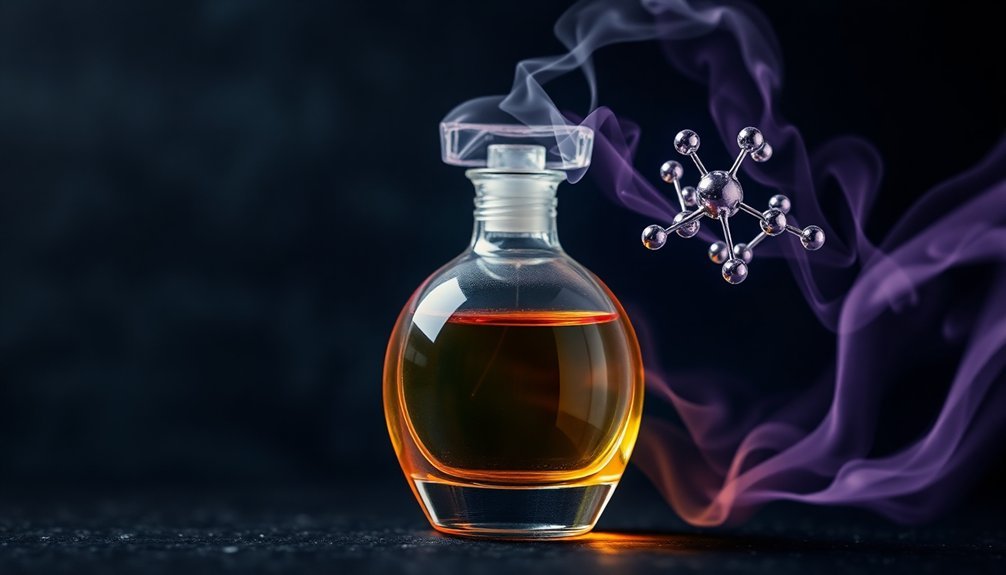
When you understand how fragrance molecules work, you'll better appreciate why some scents linger while others quickly fade. The key lies in molecular volatility – how quickly a substance evaporates from liquid to gas.
Light, small molecules evaporate rapidly, creating those fleeting top notes you notice immediately upon application.
In contrast, heavier molecules like patchouli, amber, and musk take their time evaporating, which is why they form the lasting heart and base notes of your fragrance. This explains why Eau de Parfum, with its higher concentration of these molecules, typically lasts longer than other formulations.
Think of it like a molecular weight contest: the heavier the molecule, the longer it stays on your skin.
You'll find these weightier, more resinous compounds in many long-lasting perfumes, as their molecular structure naturally resists quick evaporation, allowing you to enjoy their scent for hours.
Understanding Base Notes Vs Top Notes
When you smell a fragrance, you'll notice that top notes with their small, light molecules evaporate within the first hour, while base notes containing heavier molecules can last for hours or even days.
The chemistry behind this layering effect relies on different molecular weights and chemical bonds, where lighter compounds like citrus oils flash off quickly while heavier compounds like musks and vanillas stick around longer. Dry skin reduces fragrance longevity significantly compared to oily skin types, which help retain scent molecules more effectively.
The dramatic difference in evaporation rates between top and base notes creates a natural progression of scent, moving from bright initial impressions to rich, lasting foundations.
Molecular Weight And Duration
In perfumery, molecular weight plays a decisive role in determining how long a fragrance note will last on your skin. It's a simple principle: heavier molecules evaporate more slowly, while lighter ones dissipate quickly. You'll notice this in action as the fragrance develops throughout the day. Fixative compounds bind with volatile molecules to help stabilize and extend the life of fragrances.
| Molecular Weight | Volatility | Duration |
|---|---|---|
| Heavy (Base) | Low | 6-24 hrs |
| Medium (Middle) | Moderate | 2-6 hrs |
| Light (Top) | High | 10-30 min |
| Very Light | Very High | 1-10 min |
When you're choosing a fragrance, understanding this relationship helps explain why those fresh citrus top notes fade quickly while woody base notes linger. You'll find that fragrances with a higher proportion of base notes typically last longer, as their heavier molecular structure allows them to stay on your skin.
Chemistry Behind Note Layers
Understanding the chemistry behind fragrance layers reveals why perfumes unfold in distinct stages on your skin. The key lies in molecular structure and volatility.
Top notes, composed of light molecules like citrus oils, evaporate quickly, giving you that initial burst of freshness. As these dissipate, heart notes emerge with medium-weight molecules, typically featuring florals and spices that create the fragrance's core personality.
Base notes contain the heaviest molecules, such as musks and woods, which evaporate slowly and provide lasting power.
You'll notice how these three layers work together like a well-orchestrated symphony. Your skin chemistry plays a significant role too, interacting uniquely with each note layer. This explains why the same perfume can smell different on various people while maintaining its characteristic progression from top to base notes.
Evaporation Rate Differences
The distinct evaporation rates between fragrance notes create a dynamic scent journey on your skin.
You'll notice top notes immediately, but they'll vanish within 15-20 minutes due to their small, light molecules. These citrus and herbal scents make your first impression before giving way to middle notes.
Middle notes, featuring florals and spices, stick around for 1-3 hours and form your fragrance's core identity. They're more complex than top notes and link the gap to the base notes.
You'll find base notes are the most tenacious, lasting 4-12 hours or more. Their large, heavy molecules contain woody, musky, and sweet scents like vanilla and sandalwood.
This layered structure guarantees you'll experience a smooth shift as each note evaporates at its own rate.
How Your Skin Chemistry Affects Longevity
Your skin's pH balance plays a vital role in how long fragrances last, with the ideal slightly acidic range of 4.5 to 5.5 helping scents adhere better to your skin.
The natural oils your skin produces can either enhance or diminish fragrance longevity, as oily skin tends to trap scents longer while dry skin absorbs them more quickly.
Your unique bacterial composition and body chemistry create a distinctive environment that interacts with fragrance molecules, which explains why the same perfume can smell and last differently on you compared to someone else.
Ph Balances Matter Most
While many factors influence fragrance longevity, skin pH plays the most essential role in how perfumes interact with your body chemistry. Your skin's natural pH, which ideally ranges between 4.5 and 5.5, creates the perfect environment for fragrances to develop and last.
When your skin's pH is balanced, you'll notice that perfumes adhere better and evolve more predictably. This is especially true for heart notes, which interact with your skin's natural oils.
Base notes like oud and amber tend to be more resilient regardless of pH fluctuations, while citrus top notes are highly sensitive to pH changes.
You can optimize your fragrance's longevity by maintaining healthy skin pH. Try applying an unscented moisturizer before your perfume and stick to gentle skincare products that won't disrupt your skin's natural balance.
Natural Oils and Retention
Natural skin oils serve as essential anchors for fragrance molecules, determining how long your favorite scent will last throughout the day.
Your skin's natural oil production creates a unique chemical environment that interacts with perfume compounds, affecting both their staying power and how they evolve on your skin.
If you have oily skin, you'll likely notice your fragrances last longer, as the oils help trap and slowly release the scent molecules.
To enhance this effect, you can layer your fragrance by using matching shower gels and body creams.
Your body temperature also plays a significant role – warmer areas like pulse points help activate the fragrance ingredients, creating a more sustained release.
Remember that your individual body chemistry, influenced by genetics and hormones, makes your fragrance experience entirely personal.
Individual Bacterial Composition
Because everyone's skin harbors a unique bacterial ecosystem, fragrances interact differently with each person's microbiome. Your skin's natural bacteria can alter how fragrance molecules develop and project throughout the day, creating a personalized scent experience.
Your skin's bacterial composition directly influences how different fragrance notes evolve over time. When your microbiome is balanced and your skin is well-hydrated, you'll notice better fragrance retention and more consistent scent development.
However, if your skin's bacterial balance is disrupted, you might experience unexpected changes in how your perfume smells and lasts.
Various factors can affect your skin's microbiome, including medications, diet, and hormonal changes. These elements work together to create your distinctive skin chemistry, which ultimately determines how fragrances perform on your skin.
Weather and Temperature Impact on Scents
Since weather conditions greatly influence how fragrances perform, understanding their impact can help you choose and wear scents more effectively.
Temperature plays an essential role – in hot weather, your fragrance will project more but fade faster, while cold weather makes scents last longer but stay closer to your skin.
Humidity levels also matter considerably, as moist air helps fragrances bloom and last, while dry conditions can make them evaporate quickly.
Consider these key weather effects on your fragrance:
- High heat amplifies top notes and increases projection but shortens longevity
- Cold temperatures emphasize base notes and extend wear time but reduce sillage
- Humid conditions enhance projection and longevity, while dry air accelerates evaporation
To maximize performance, pair fresh, light scents with hot weather and reserve rich, warm fragrances for cooler days.
Maximizing Your Fragrance's Staying Power
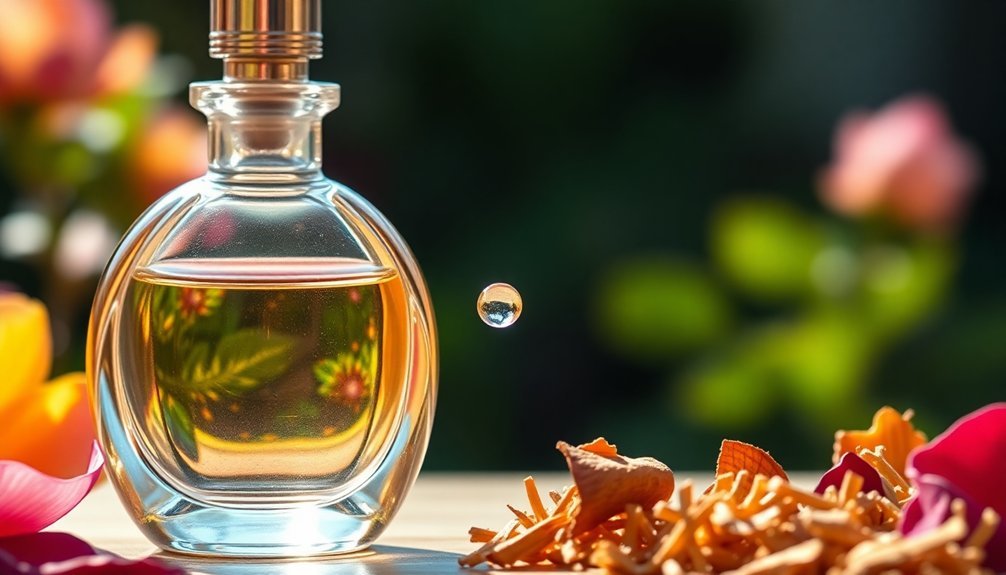
While personal fragrances can enchant and delight, their longevity often determines their true value. You'll get the most lasting power by choosing fragrances with higher oil concentrations, like Eau de Parfum or solid perfumes, which contain 15-20% essential oils.
To maximize your fragrance's staying power, apply it to pulse points immediately after showering when your skin is still warm and moisturized.
Don't rub the perfume into your skin, as this can break down the fragrance molecules. Instead, let it dry naturally. You can enhance longevity by layering complementary scented products.
Store your perfumes properly in cool, dark places and keep them upright in their original containers.
Look for fragrances with strong base notes like sandalwood or vanilla, as these contain larger molecules that evaporate more slowly.
Building Long-Lasting Custom Blends
Creating your own long-lasting custom fragrance blend starts with understanding how different scent molecules interact.
When you're building your blend, focus on incorporating fixatives like benzoin or myrrh to stabilize the more volatile components.
Layer your fragrances strategically, starting with heavier base notes that have larger molecular structures.
To create a blend that lasts, consider these key components:
- Select woody or resinous base notes like patchouli or sandalwood as your foundation
- Add fixatives such as frankincense or musk to anchor the volatile elements
- Layer complementary notes at different evaporation rates to maintain continuity
Frequently Asked Questions
Do Synthetic Fragrances Last Longer Than Natural Ones?
Yes, synthetic fragrances will last longer than natural ones because they contain chemical fixatives and stabilizers. You'll find they can stay fresh for up to 5 years, while natural scents only last 1-2.5 years.
Can Certain Medications Affect How Long Perfume Lasts on Skin?
Yes, your medications can alter your body chemistry and affect how long perfume lasts on your skin. Some drugs change your pH levels, hormone balance, and oil production, which directly impacts fragrance longevity.
Why Do Some People Become "Nose Blind" to Their Fragrances?
You'll become "nose blind" when your brain naturally filters out familiar scents to prevent sensory overload. This adaptation happens with prolonged exposure to the same fragrance you wear regularly.
Does Diet Influence How Long Fragrances Last on Skin?
Yes, your diet directly affects fragrance longevity. When you eat spicy foods, your skin becomes oilier, helping scents last longer. Conversely, a dry diet can make your skin less receptive to holding fragrances.
Can Storing Perfumes Incorrectly Affect Their Longevity When Worn?
Yes, improper storage can greatly reduce your perfume's longevity when worn. If you expose fragrances to heat, light, or humidity, they'll break down chemically, resulting in weaker performance and altered scents on your skin.
In Summary
You'll find that creating longer-lasting fragrances comes down to understanding molecular weights, your unique skin chemistry, and environmental factors. By choosing scents with strong base notes, applying to moisturized skin, and layering complementary fragrances, you can extend your perfume's life. Remember, what works for others might not work for you, so don't be afraid to experiment until you find your perfect, long-lasting combination.
References
- https://experience.themerchantofvenice.com/en/2025/01/01/the-longevity-of-a-fragrance/
- https://www.good-chemistry.com/blogs/news/fragrance-longevity-101-cause-effect
- https://www.lpude.in/SLMs/Master of Business Administration/Sem_2/DEPEL537_COMMUNICATION_FOR_LEADERS .pdf
- https://zayya.co.za/the-science-of-perfume-longevity-key-factors-and-tips/
- https://scentjourner.com/blogs/perfume-know-how/the-impact-of-climate-on-perfume-longevity-and-sillage-how-to-enhance-your-fragrance-performance
- https://nyc.ph/blogs/inspiration/understanding-the-science-behind-long-lasting-fragrances-from-ingredients-to-formulas
- https://zacshop.com/blogs/perfumes-fragrances/perfume-longevity-how-long-does-your-perfume-last
- https://helmlondon.com/en-us/blogs/blog/the-science-behind-long-lasting-scents-in-oil-based-perfumes
- https://www.ucsf.edu/news/2023/03/424956/making-sense-scents
- https://fragrance5ml.com/en-us/blogs/articles/the-science-of-perfume-longevity-how-to-make-your-scent-last
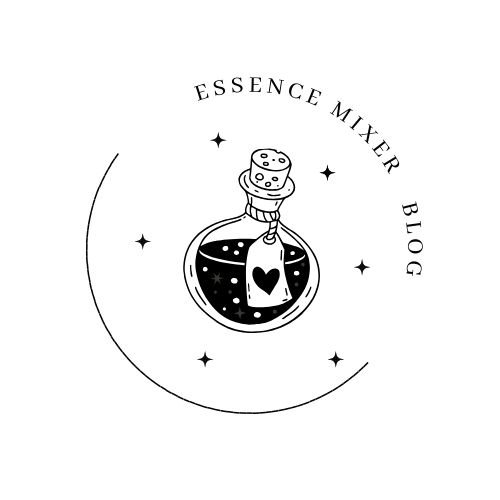
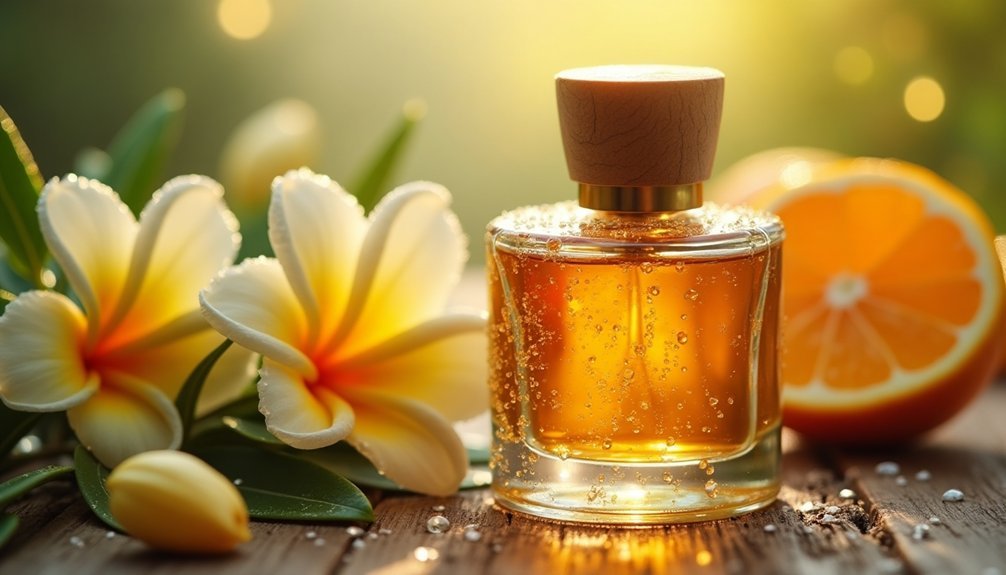

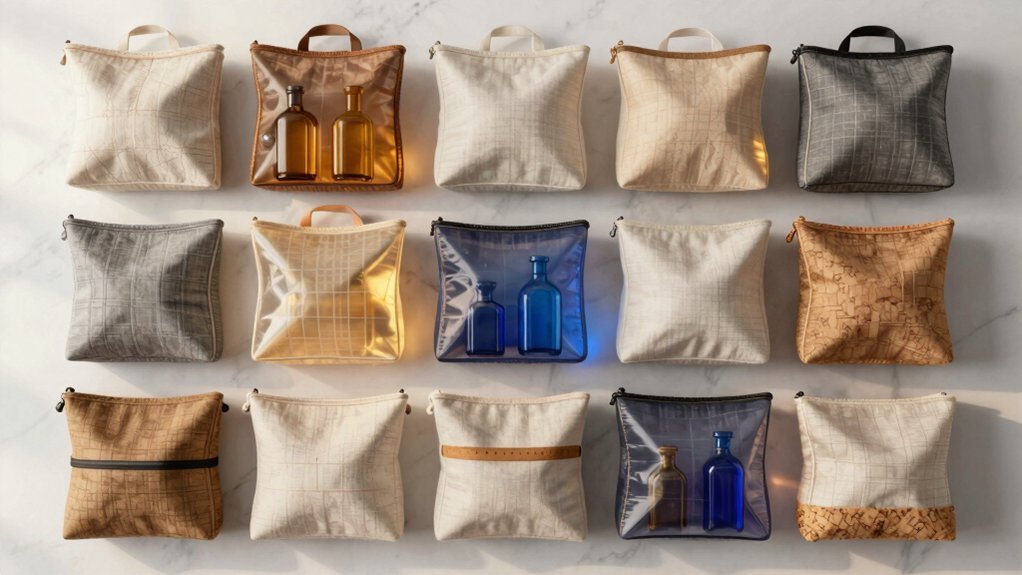
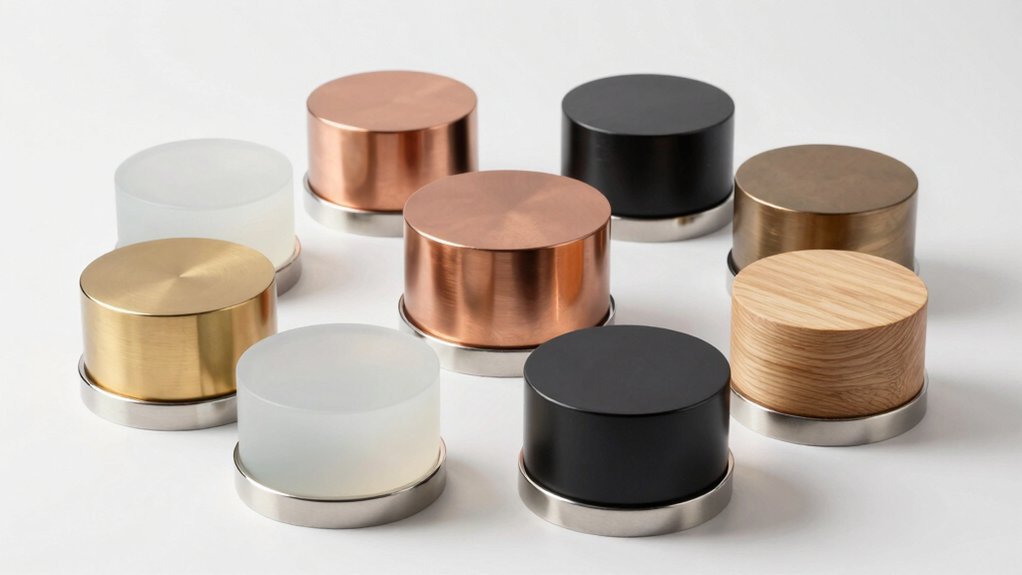
Leave a Reply